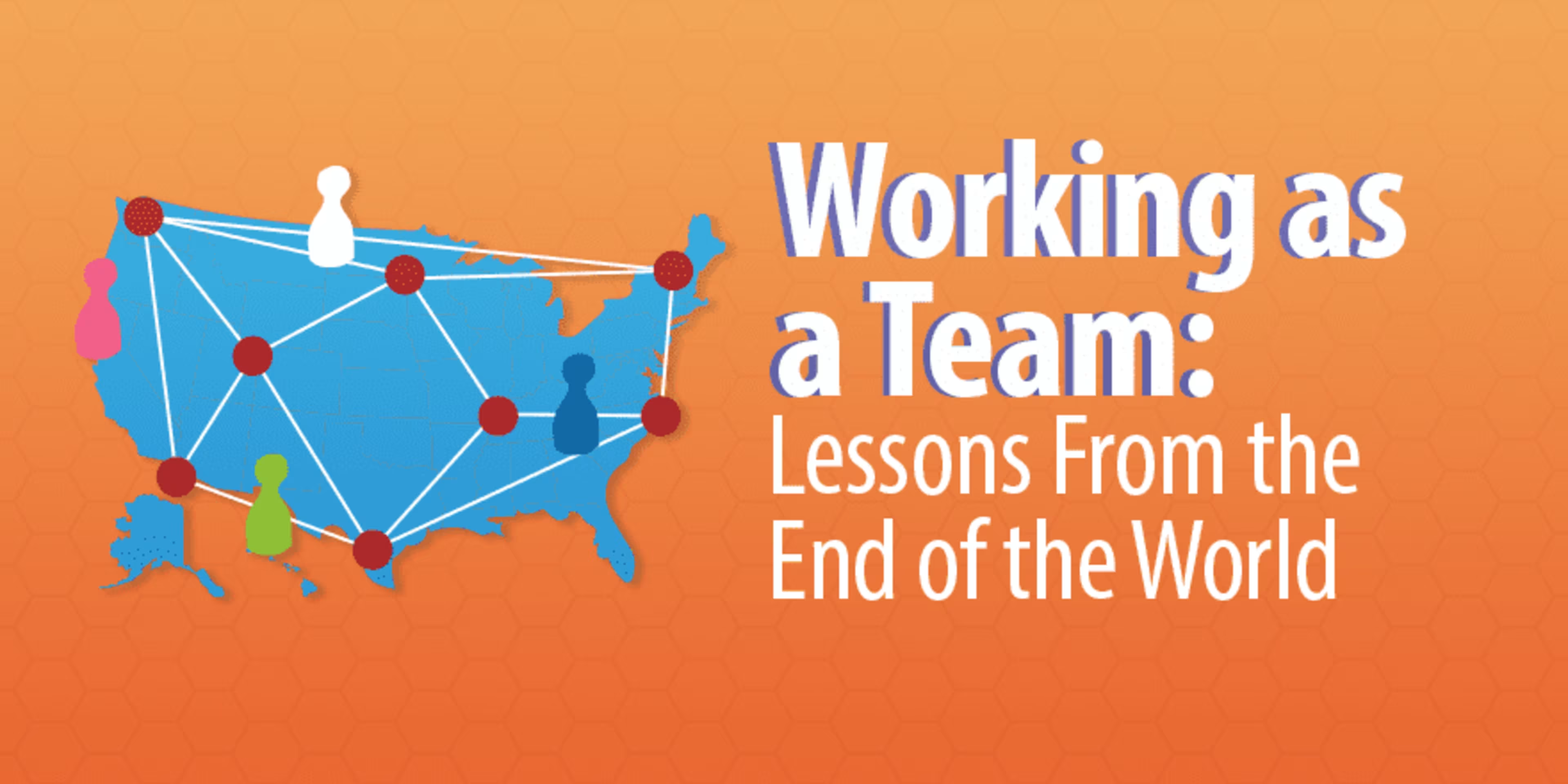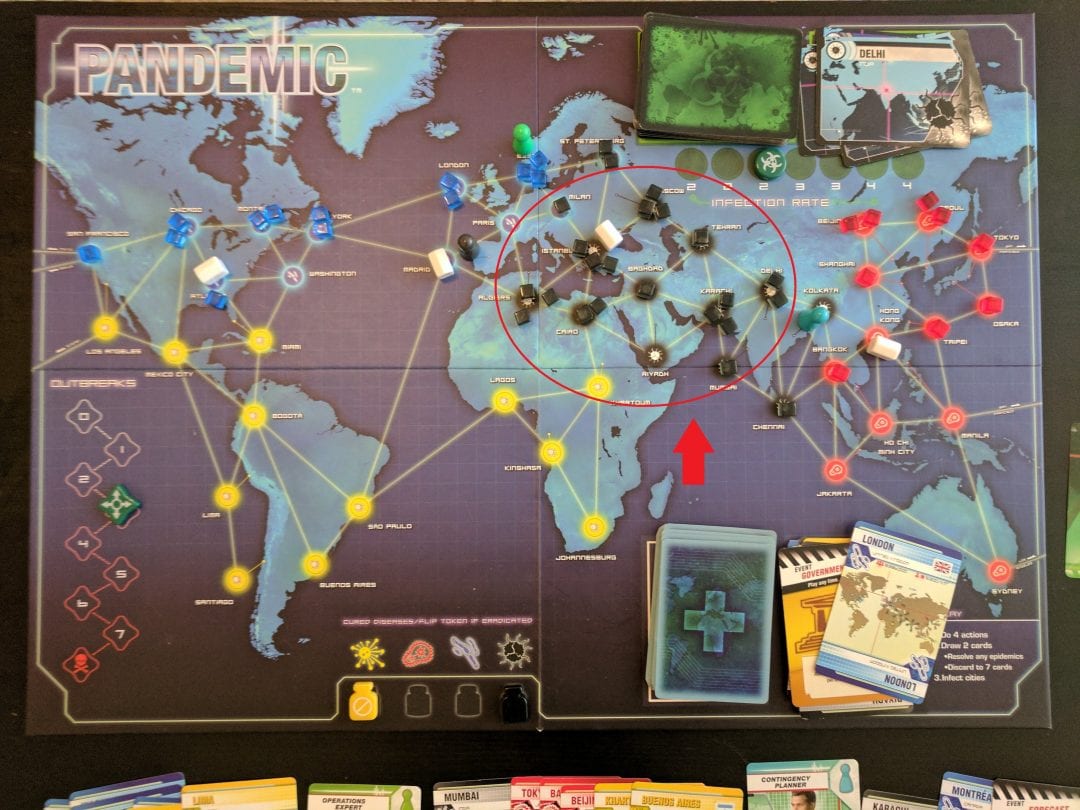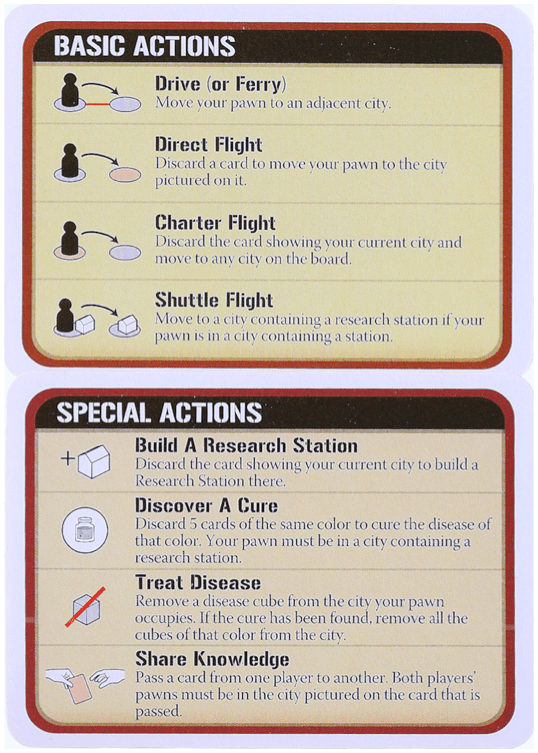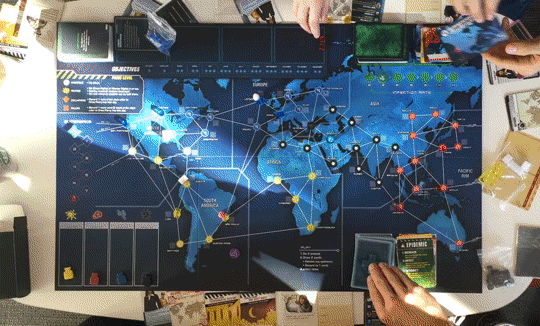Have you ever played Pandemic?
It's an addictive board game that capitalizes on pop culture's current obsession with apocalyptic disease outbreaks. It's collaborative; you have to work together as a team to find cures for four different diseases infecting the globe.
Pandemic is a great game for people who like strategy, seeing the big picture, and working with others.
It's not as great for overly competitive, Type A individuals who are bad at listening.
I freely admit: I am the latter.
But even Type A's have to work with others sometimes to get things done.

While working as a team can occasionally be a bumpy ride (I'm looking at you, every group project I ever did in high school) it's also the best way to get certain jobs done well.
Whether you're managing a team of individuals with vastly different personalities, or you just need a few reminders on how to play nice with others, you should read on.
If you're managing a team, you might want to look at this short video on best practices and how online software can assist.
Because your favorite overly competitive, unapologetically bossy, occasionally too stubborn blog writer took it upon herself to play Pandemic with her friends all weekend to learn these lessons about teamwork so you don't have to.
Below are the six lessons I learned about teamwork while trying to save the world with my friends.
Lesson 1: Have a clear goal
Working together is only possible when everyone on your team is working toward a common goal.
In Pandemic, the shared goal is finding cures for the four diseases plaguing the world.
There are different strategies for how to create these four cures. And the game is designed so that there a lot of distracting problems that come up while trying to accomplish your ultimate goal.
Infections of different cities occur at random, and epidemics can break out at any time without notice. Players have to put out a lot of small fires throughout the duration of the game.
And these little obstacles can often derail your plan for saving the world through modern medicine.

A game where we let an outbreak overtake the Middle East, so we ultimately lost
How this translates to your team
Does the scenario I described above sound a little like your typical workday?
For example, let's say your team has a giant ongoing project taking up most of their time, such as adding a new customer portal to your website.
In the meantime, you must still take care of day-to-day tasks such as making sure your organization's network is performing optimally or unjamming the printer for the tenth time this week.
These smaller issues might be distracting, but you still have a project deadline you have to meet. Setting a clear goal such as "the new customer portal will go live by next Monday" helps your team stay on track. They'll know which tasks they need to prioritize and which tasks can wait.
Takeaway: While you still have to take care of day-to-day problems, such as preventing malware from overtaking your systems, you know that each day must bring you closer to the goal of finishing your team's big project.
Lesson 2: Assign clear responsibilities
Since we're talking about working in a team, it goes without saying that you can't be in charge of everything.
I write that seemingly redundant piece of information because I constantly have to be reminded of that fact, and maybe you do, too.
I repeat: When you are part of a team, you are not allowed to do everything by yourself.
Pandemic offers seven roles, assigned at random. Each role has a skill or two that no other role is capable of carrying out. Each of these special skills is written out clearly on a role card.

The "Scientist" role card needs fewer matching cards to cure a disease (Image credit: ThereWillBeGames)
Everyone can see what a particular role's capabilities are, which means everyone can think of game strategies built around each player's particular skills.
How this translates to your team
By clearly defining roles and responsibilities at the start, your team is able to move forward more quickly. Everyone knows what each person should be doing.
You've defined your goal of creating a new customer portal by next Monday, but not everyone knows exactly what they should be doing right away to accomplish that goal.
You can only accomplish large goals by completing lots of small tasks along the way.
While you may not have a team of specialists, as is the case with the roles in Pandemic, it's still a lot easier to get small tasks done when each person is in charge of their own set of related tasks.
Before jumping into a big project, make sure that everyone on your team knows exactly what their immediate responsibilities are.
Takeaway: Not only will assign clear responsibilities to ensure that nothing falls through the cracks, it'll also help to develop team leaders with their own sets of unique skills and capabilities.
Lesson 3: Be flexible
I think it goes without saying that during an apocalyptic disease scenario, not everything goes according to plan.
Although everyone has assigned roles, to deal with changing infection rates and random disease outbreaks in Pandemic, there's a set of eight actions that everyone is capable of performing.

The eight actions every role in Pandemic can perform (Image Credit: Stephan Wessels)
That means that even if I'm the "Scientist" and need to concentrate on collecting cards from other players, people can still look to me for other actions, such as treating disease, that will help other players in the game.
Whatever comes up, in Pandemic and in your tech team's day-to-day, you might need to adjust your original strategy or assign different tasks to your team that they might not have expected.
How this translates to your team
Deadlines can change. Budgets can go up or down. Local laws might mean you have to build extra security into your portal that collects customer information.
While everyone should know what they're responsible for to achieve your team's larger goal, having assigned roles should help your team's process—not restrict team members from getting things done.
For example, maybe you had your best engineer working on an eCommerce integration for your new customer portal. But you just got the green light to hire a freelance coder to help your overloaded team.
If you want your new hire to learn from the best, it might be worth asking your senior engineer to change their focus for a day or two to help with training so your new team member can perform at a high level from the outset.
Takeaway: While assigned roles and responsibilities help your team move forward efficiently, as soon as they start working against you, feel free to change things up to best suit your new needs.
Lesson 4: Communicate clearly
How can you know if things are going wrong if people don't speak up? And how is your team supposed to know what to do if you don't give clear instructions?
In Pandemic, everyone can see the game board, so they know where diseases are a problem or which regions require little to no attention. In some versions of play, you can even see everyone's cards, so you know which resources they're working with.
This set-up might be a little more transparent than most teams working together, but it still requires constant communication with every other player in the game.
For example, you may find yourself explaining moves that will make sense after four other turns have been played, so you must be clear about what needs to happen in each move.

Communication is the key to a good marriage, good teamwork, and a good game of Pandemic (Image Credit: Board Game Geek)
How this translates to your team
You might not have time to explain the reasoning behind every task, but when your team asks questions, pay attention. It's a sign that they don't understand what you've asked them to do, or that they disagree with you about how to do something.
And while you're not obligated to agree with your teammates, keep in mind that, especially when working on a large or complicated project, there are often many different ways to complete it. Your teammates might actually have a good idea or two if you give them a chance to chat with you.
For example, there are a lot of ways to create a customer portal for your website. And wouldn't you rather discuss as many options as possible with your knowledgeable tech team before you have to explain things in laymen's terms to the rest of your company?
Takeaway: Explaining goals concisely and giving clear instructions is always a great way to kick off a project. But keeping the lines of communication open throughout is a great way to keep a project on track, head off small issues before they become big problems, and make your team's job much more enjoyable along the way.
Lesson 5: Be respectful of everyone's input
Let's be clear: by "communicate," I don't mean talking to your teammates and telling them what to do.
Communication is a two-way street, and it involves both talking and listening.
Personally, I'm not great at the "listening" half of communication. And this quality of mine does not make me a great Pandemic player. However, an often repeated phrase in the instructions goes something like: "You can only do X with Player Y's permission."
That means that, unless I want to end up playing Pandemic alone, I can't just boss people around; I have to ask for their input.
And take it from someone who knows: If you don't ask nicely, or if you reject others' ideas all the time, you will end up doing everything by yourself.

This guy doesn't understand why no one will play Pandemic with him anymore (Image credit: Shut Up & Sit Down)
How this translates to your team
"Now, wait a minute," you might be saying. "This board game analogy has gone too far. My team members get paid to work on these projects. There's no way I'll end up working alone on everything."
And you are right, to some extent. But ask yourself this: Would you rather work with someone who constantly ignores your suggestions or with someone who respects your ideas?
Just like my friends sometimes threaten to quit playing Pandemic with me when I get too despotic about how to save the world, most employees who quit their jobs do so because they don't feel respected.
Part of being a good team member is respecting everyone else on your team. Everyone is allowed to have a bad day every now and then. But if you find yourself constantly snapping at everyone or rejecting ideas because they're not your own, you might be the problem.
Takeaway: Listen to your teammates' points of view, or you might find that you don't have anyone to count on when you've got a tough problem to solve.
Lesson 6: Share your knowledge and skills
More than being respectful of others, why is listening to your teammates the right thing to do?
Because no one, not even you, knows everything.
It's impossible to win Pandemic without trading cards, which is called "sharing knowledge" in the game. Without exchanging knowledge, the world is doomed.
I think that last sentence holds true for everything in the real world. And it also applies to the microcosm of your tech team.
How this translates to your team
Everyone on your team, including you, has a different set of skills. And those different skills come in handy at different times.
Maybe your teammate is great at coding and took the lead role designing the ins and outs of the new customer portal your team has been working on. Unfortunately, public speaking isn't their strong suit, so they're not looking forward to presenting the final results to stakeholders.
Fortunately for your teammate (and your team), you've got their back. You're a total ham, and you love chatting with everyone in the boardroom about all the cool things your team does.
Everyone has something unique to contribute, whether it be a particular skill, a different perspective, or a helpful piece of information.

Sharing is caring...for those affected by plagues. (Image credit: NPR)
Takeaway: Stepping in when you have something to offer your team is ultimately what saves the world...or what makes a new website feature go live.
Either way, you couldn't have done it alone.
Can working as a team help you save the world?
So I've laid out my arguments for why teamwork is the best way to get things done.
I've also told you that communication is half talking and half listening. So now I want to hear from you.
What are your experiences with working as a team? Do you think small teams are the ultimate organizational model for the workplace? Or should everyone go it alone? Would the business world be better off if everyone was left to their own devices?
Let me know in the comments below.